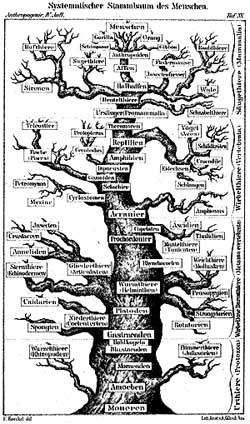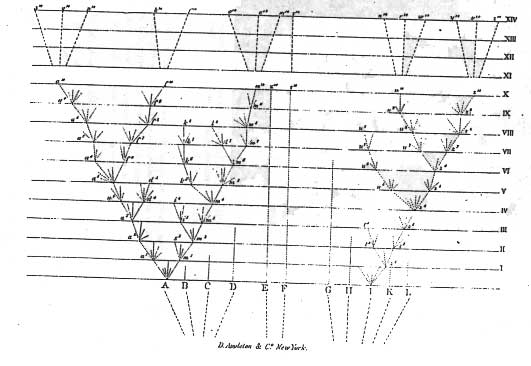Serendip is an independent site partnering with faculty at multiple colleges and universities around the world. Happy exploring!
Evolution as Story I
Science and literature (and literary studies) are
- works in progress
- "stories," things to make use of rather than to "believe in"
- things that require engagement, interpretation, extension by the listener/reader
- other similarities/differences?
Moving on to the case in hand: evolution
"On the surface, the debate centers on a passage in the state’s curriculum that requires students to critique all scientific theories, exploring “the strengths and weaknesses” of each. Texas has stuck to that same standard for 20 years, having originally passed it to please religious conservatives. In practice, teachers rarely pay attention to it.
This year, however, a panel of teachers assigned to revise the curriculum proposed dropping those words, urging students instead to “analyze and evaluate scientific explanations using empirical evidence."
...
"Stephen C. Meyer, an expert on the history of science and a director at the Discovery Institute, denied that the group advocated a Biblical version of creation. Rather, Mr. Meyer said, it is fighting for academic freedom and against what it sees as a fanatical loyalty to Darwin among biologists, akin to a secular religion.
Testifying before the board, he asserted, for instance, that evolution had trouble explaining the Cambrian Explosion, a period of rapid diversification that evidence suggests began about 550 million years ago and gave rise to most groups of complex organisms and animal forms." ... "The chairman of the board, Dr. Don McLeroy, a dentist, pushed in 2003 for a more skeptical version of evolution to be presented in the state’s textbooks, but could not get a majority to vote with him. Dr. McLeroy has said he does not believe in Darwin’s theory and thinks that Earth’s appearance is a recent geologic event, thousands of years old, not 4.5 billion as scientists contend."question is not whether "Darwin's theory" is "true," or whether evolution is "true" but rather how one evaluates scientific stories (and other stories?)
Key issues about scientific stories (including evolution)
-
What observations do they summarize?
- In what context are they useful?
-
What new questions/observations do they motivate?
- Are they works in progress, things that help others see in new ways, encourage others to contribute to?
How good a scientific story is evolution?
work in progress, based on observatons, that helps others see things in new ways, encourages others to contribute additional new things?
1859, Origin of Species (itself passing through multiple editions)
|
Introduction "Until recently, the great majority of naturalists believe that species were immutable productions, and had been separately created." (p 79) "it is quite conceivable that a naturalist, reflecting on the mutual affinities of organic beings, on their embryological relations, their geographical distribution, geological succession .... might come to the conclusion that each species had not been independently created but had descended, like varieties, from other species" (p 96) "It is, therefore, of the highest importance to gain a clear insight into the means of modification and coadaptation." (p 97). "Although much remains obscure, and will long remain obscure ... I am fully convinced that species are not immutable ... Furthermore, I am convinced that Natural Selection has been the main but not exclusive means of modification." (p 98) Chapter 1 Variation Under Domestication "When we look to the individuals of the same variety of sub-variety of our older cultivated plants and animals, one of the first points which strikes us is that they generally differ much more from each other than do the individuals of any one species of variety in a state of nature" (p 99) "Perhaps the correct way of viewing the whole subject would be to look at the inheritance of every character whatver as the rule and non-inheritance as the anomaly." (p 103) "On the Breeds of the Domestic Pigeon. --- Believing that is always best to study some special group, I have, after deliberation, taken up domestic pigeons ...." (p 107) "all of our domestic breeds have descended fom the Columbia livia ... those characters whih are mainly distinctive of each breed ... are in each breed eminently variable. Pigeons ... have been domesticated for thousands of years ..." (p 111) "I have discussed the probable origin of domestic pigeons at some, yet quite insufficient, length; because when I fist kept pigeons, I felt fully as much difficulty in belieiving that they could ever have descended from a common ancestor as did any naturalist could ... they well know that each race varies slightly, yet they ignore all general arguments and refuse to sum up in their minds slight differenes accumulated during many successive generations." (p 112) "Selection. --- Some little effect perhaps b attributed to the direct action of the external conditions of life and some little to to habit; but he would be a bold man who would account by such agencies for the differences between a dray and race horse, a greyhound and bloodhound, a carrier and tumbler pigeon." (p 113) If selection consisted merely in separating some very distinct variety and breeding from it, the principle would be so obvious as hardly to be worth notice; but its importance consists in the great effect produced by the accumulation in one direction, during successive generations, of differences absolutely inappreciable by an uneducated eye." (p 114) "the seed raisers do not pick out the best plans, but merely go over their seed-beds and pull up the "rogues"" (p 115) "I have seen great surprise expressed in horticultural works at the wonderful skill of gardners, in having produced such wonderful results from such poor materials; but the art, I cannot doubt, has been simple and, as far as the final reslt is concerned, has been followed almost unconsciously. It has consisted always in cultivating the best known variety .. and, when a slightly better variety has chanced to appear, selecting it, and so onwards. But the gardners of the classical period, who cultivated the best pear they could procur, never thought what splendid fruit we should eat ...." (p 117) "He can never act by selection, except on variations, which are fist given to him in some slight degree by nature." (p 118) "The man who first selected a pigeon with a slightly longer tails, never dreamed what the descendents of that pigeon would become through long-continued, partly unconscious and partly methodical selection." (p 119) |
Some further elaboration
Adaptive diversity can result from undirected variation and "selection" (= differential persistance, regardless of intent)
Switch in story telling style from non-narrative foundational to narrative foundational to emergence
| Great Chain of Being |
Fixed Entities, Tree of Life |
Emergence |
 |
 |
 |
| spatial order, time irrelevant | time relevant, but playing out eternal or inevitable order | time critical, order changing as it goes along |
Further evolution of the story of evolution to come ...
- additional observations
- "undirected variation"?
- "struggle for existence"?
- survival of the fittest?
- towards perfection?



Comments
Post new comment